100% placement in the first CSE batch of SRM University-AP with the highest offered salary of 50 LPA
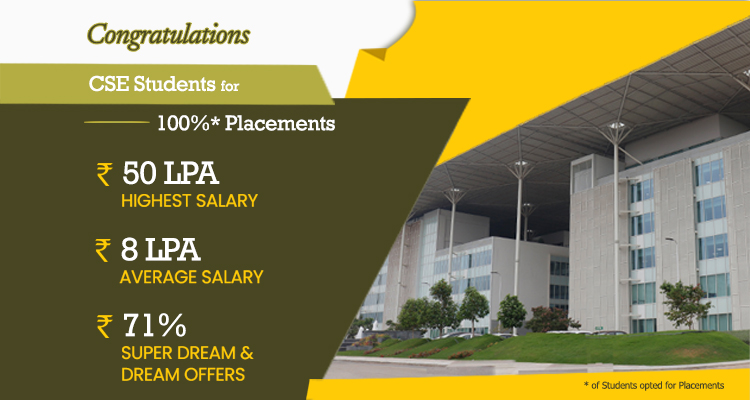 While the maiden batch of the nascent SRM University-AP is ready to set foot for the next venture, the Department of Computer Science and Engineering (CSE) proudly announces 100% successful placement for its students. The first-ever placement drive in SRM University-AP began last year amid the COVID-19 pandemic. However, overcoming all the difficulties, the talented engineers of the CSE department found their passion and a job offer according to their will. The brilliant students of CSE bagged envious offers with the highest salary of 50 LPA and an average salary of 8 LPA. 71% of the students are placed with Super Dream and Dream offers, which is highly commendable.
While the maiden batch of the nascent SRM University-AP is ready to set foot for the next venture, the Department of Computer Science and Engineering (CSE) proudly announces 100% successful placement for its students. The first-ever placement drive in SRM University-AP began last year amid the COVID-19 pandemic. However, overcoming all the difficulties, the talented engineers of the CSE department found their passion and a job offer according to their will. The brilliant students of CSE bagged envious offers with the highest salary of 50 LPA and an average salary of 8 LPA. 71% of the students are placed with Super Dream and Dream offers, which is highly commendable.
Amid the unprecedented crisis, the hiring process was a difficult task to be performed for both the students and the recruiters. Corporate Relations and Career Services (CR&CS), the placement team of the university, has done an excellent job by conducting the placement drive with passion and dedication. The students were provided with every support they needed during these trying times. During their internships and projects in reputed companies, the students had hands-on experience, industry exposure, and became aware of the expectations of the corporate world. This experience helped the students to prepare for the job interviews. The numerous training sessions arranged by the CR&CS team for core and soft skill development brushed up their knowledge and personality. The mock interviews, sessions with corporate experts also assisted the students in their preparation. The interdisciplinary modernised curriculum provided the students with in-depth knowledge in their domain, strengthening their basic skills.
“Every moment at SRM-AP was so defining. Academics and research, 24×7 student-run Next Tech Lab, Semester Abroad and Entrepreneurship at UC Berkeley, USA and winning Hackathon in Bay area competing with MIT, Stanford and Carnegie Mellon gave us the wide exposure of the real world, which would not have been possible without the continuous support of our faculty and university management. Now, it is time that we start our life in Japan, and we are very much looking forward to the new chapter,” said Rajarshi Mazumder, who has received the highest offer of this season with a pay package of 50 LPA along with his twin Saptarshi. Sri Ritika Katragadda, who has been offered one of the best packages with 29.5 LPA, opined, “The selection process was tough, but with the extensive knowledge we gained in the classroom studies, I cleared it with ease.”
“The support I received from my professors and CR&CS team is unforgettable. I am forever grateful to their guidance, for being able to secure such a good offer,” said Sai Krishna Rohith, who bagged an offer of 20 LPA. “Prof Ragunathan is like a father figure to me. I can reach him anytime without any hesitation, even in case of a smallest doubt. All other faculty members were equally supportive,” asserted Venkata Sai Nikhith Nagamlla. Venkata also received an offer of 29.5 LPA.
Mr Vivekanandan, Assistant Director, Corporate Relations and Career Services, said, “We always looked for the best opportunities for our students. The talent exhibited by the CSE students during the internships, projects, curriculum and extra-curriculum activities naturally drew the best recruiters to SRM University-AP.”
“SRM University-AP has made its name as a reputed tech hub to the recruiters who are searching for the best engineers to recruit. We are certain that in the coming years, the numbers of top offers will further increase, creating a record in the country,” shared Professor Ragunathan, Associate Dean in the School of Engineering and Basic Sciences and Head of the Department of Computer Science and Engineering.
“SRM University-AP is founded with the vision to offer quality engineers, entrepreneurs and professionals to the country. In the First Placement Drive itself, the university has proved its mettle and has become a favourable destination for top recruiters,” said Prof V S Rao, Vice-Chancellor, SRM University-AP.
- Published in CR&CS NEWS, CSE NEWS, News, Students Achievements
Prof Puru Jena enlightens on “Beyond the Periodic Table of Elements”
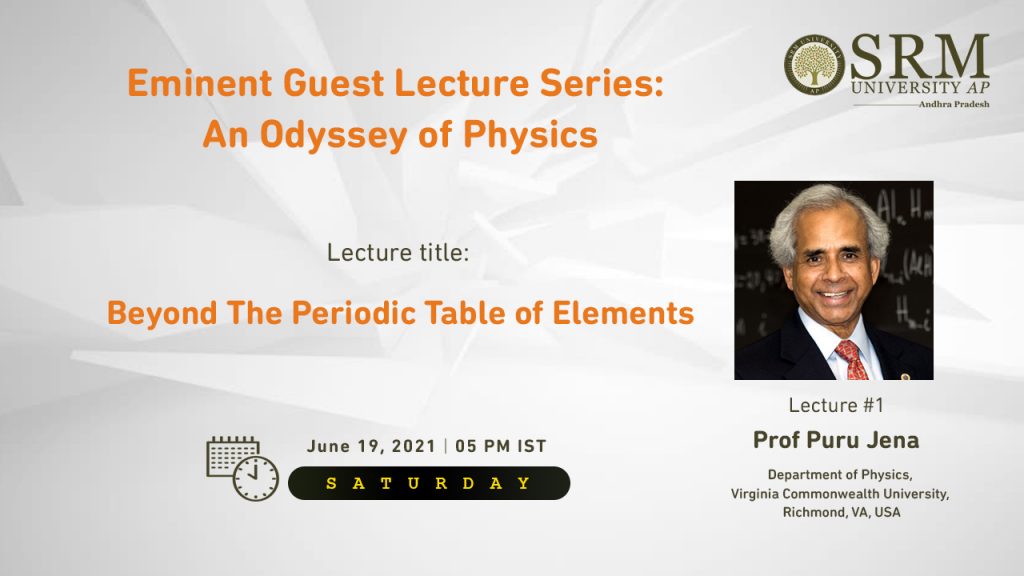 The Department of Physics, SRM University-AP, Andhra Pradesh, organizes a continual online and offline Lecture Series entitled “Eminent Guest Lecture Series: An Odyssey of Physics” to understand the recent advances and future developments in the field of Physics and allied sciences. The first seminar of this lecture series, on the theme Beyond the Periodic Table of Elements is scheduled to be held on June 19, 2021 at 5.00 pm (IST). Prof Puru Jena, distinguished Professor of Physics at Virginia Commonwealth University, USA will enlighten and engage the session with his extensive knowledge and expertise in the domain.
The Department of Physics, SRM University-AP, Andhra Pradesh, organizes a continual online and offline Lecture Series entitled “Eminent Guest Lecture Series: An Odyssey of Physics” to understand the recent advances and future developments in the field of Physics and allied sciences. The first seminar of this lecture series, on the theme Beyond the Periodic Table of Elements is scheduled to be held on June 19, 2021 at 5.00 pm (IST). Prof Puru Jena, distinguished Professor of Physics at Virginia Commonwealth University, USA will enlighten and engage the session with his extensive knowledge and expertise in the domain.
Abstract: The periodic table created by Mendeleev in 1869 is the mother of all materials. The realization that the physics and chemistry of materials at the nanoscale can be very different from their bulk and that their properties in small clusters can be tailored one atom at a time led to the hypothesis, more than twenty years ago, that stable atomic clusters with specific size and composition and mimicking the chemistry of atoms can be designed and synthesized. These clusters, known as superatoms, can form the building blocks of a new three-dimensional periodic table as well as a new class of cluster-assembled materials. In this talk, Dr Puru Jena will outline the considerable progress that has been made over the years by focusing on superalkalis and superhalogens, which mimic the chemistry of alkalis and halogens, respectively and can be used to form supersalts with uncommon properties. The ionization energies of superalkalis are less than those of alkali atoms while the electron affinities of superhaloegns are larger than those of halogen atoms. He will present examples where these superions are used to promote unusual chemistry making noble gas atoms form chemical bonds at room temperature, superhalogens forming halogen-free electrolytes in Li-ion batteries, superalkalis as building blocks of new electrides where the electron is completely detached from the host and remain localized pretending to be an anion without a nucleus, superhalogens as building blocks of multiferroic materials, and supersalts capable of enhancing the Curie temperature of 2D materials. The synergy between first principles theory and experiments in advancing our understanding of matter at the nanoscale will be highlighted.
About the Speaker: Dr Puru Jena is a Distinguished Professor of Physics at Virginia Commonwealth University and received his Ph. D. in Physics from the University of California at Riverside. He also served as Program Director at the National Science Foundation and as Jefferson Science Fellow and Senior Science Advisor at the US Department of State. Dr Jena’s research covers a wide range of topics in Nano-structured Materials, Condensed Matter Physics, and Materials Science. These include structure and properties of metals, semiconductors, superconductors, alloys, liquid metals, point and complex defects, surfaces, thin films, atomic clusters, and cluster assembled materials. His current research is focused on three major areas: Structure and properties of nano-clusters and cluster assembled materials (0 D), nanotubes and nanowires (1D) and mono- and multi layered materials (2D) with emphasis on energy storage; electronic, magnetic, and optical properties. Dr Jena is the author of nearly 630 papers including 14 edited books with Google citations and H index at 31,300 and 88, respectively. He has given over 425 invited talks in international conferences and academic institutions in 29 countries around the world and has organized 50 international conferences. He has received over $15 million dollars of funding from federal agencies such as the Department of Energy, Department of Defense, National Science Foundation, and NASA. His many honours include being the Fellow of the American Physical Society; Outstanding Scientist of Virginia; Outstanding Faculty of Virginia; Presidential Medallion, University Award of Excellence, and Outstanding Scholar from Virginia Commonwealth University. He has served as a member of numerous scientific panels including on the Presidential Commission on bilateral scientific collaboration between USA and Russia.
We welcome you to actively participate in this scholarly lecture series on 19 June 2021 at 5.00 pm (IST). For more details and registration, kindly visit the links given below:
Registration Link: https://srmap.zoom.us/webinar/register/WN_MV36TDJ1Tw6MuuG7ep8BcA
Know more about Prof Jena: https://physics.vcu.edu/jenasgroup/
Spatial dimensions of Big Data jobs for efficient cluster job scheduling
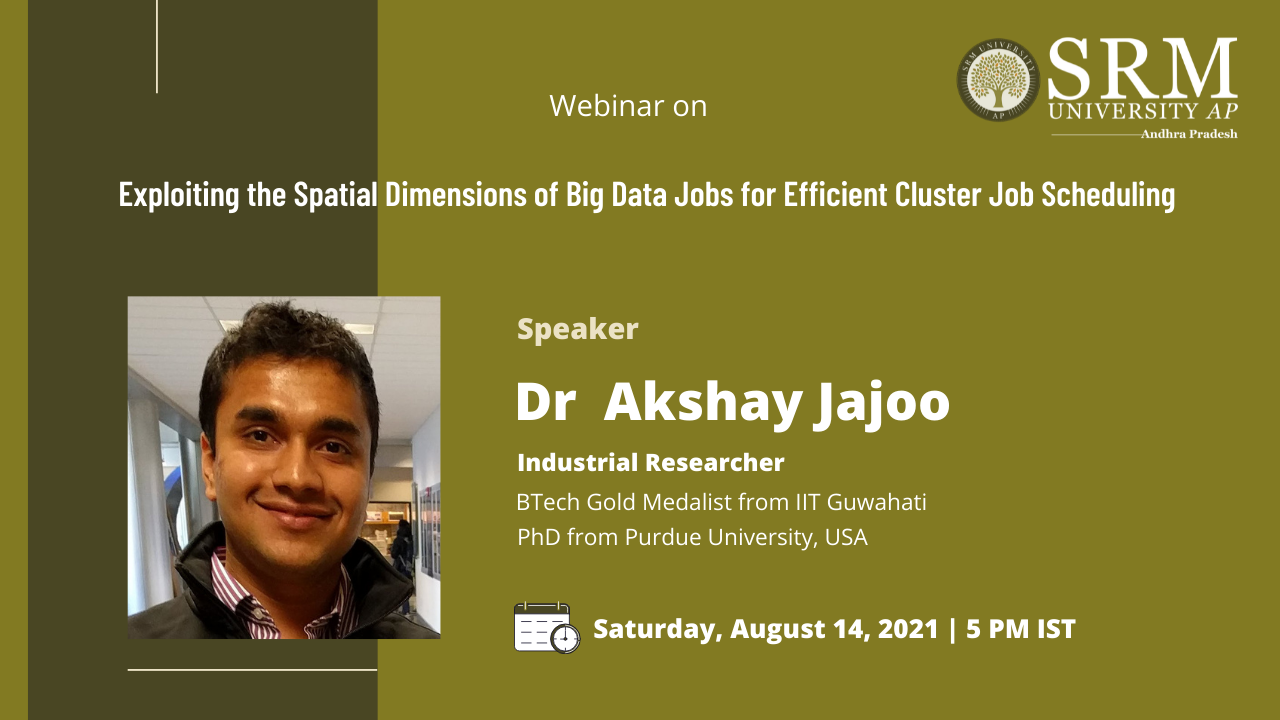 The Departments of Electrical and Electronics Engineering (EEE) and Computer Science and Engineering (CSE) jointly present a technical talk on “Exploiting the Spatial Dimensions of Big Data Jobs for Efficient Cluster Job Scheduling” on August 14, 2021, Saturday, at 5:00 pm (IST). Dr Akshay Jajoo, industrial researcher, will enlighten the students and researchers on his PhD thesis which focuses on developing novel learning and scheduling algorithms for distributed jobs in clouds.
The Departments of Electrical and Electronics Engineering (EEE) and Computer Science and Engineering (CSE) jointly present a technical talk on “Exploiting the Spatial Dimensions of Big Data Jobs for Efficient Cluster Job Scheduling” on August 14, 2021, Saturday, at 5:00 pm (IST). Dr Akshay Jajoo, industrial researcher, will enlighten the students and researchers on his PhD thesis which focuses on developing novel learning and scheduling algorithms for distributed jobs in clouds.
The session, coordinated by Dr Tousif Khan N, Head of the Department of Electrical and Electronics Engineering, will cover the details of the concepts, use cases, and involved technology overview. Avid researchers and prospective industrialists are welcome to join the event.
About the Speaker:
Dr Jajoo earned his doctoral degree in computer science from the esteemed Purdue University, USA. His thesis proposes, validates, and designs systems that employ learning algorithms exploiting spatial dimensions. His research focussed on the use of spatial dimensions for efficient scheduling of distributed jobs and to speed up Coflows and big data jobs. While doing B. Tech at IIT Guwahati, he was awarded Gold Medal for academic achievement, extracurricular activities, and community service. On account of his outstanding academic record, Dr Jajoo was granted different scholarships to pursue research in France and Germany. He has also been a member of ISSA, ACM, and CERIAS.
Link to Abstract: https://www.cs.purdue.edu/homes/ajajoo/finals/akshay_jajoo_phd_thesis_abstract.pdf
Registration Link: https://srmap.zoom.us/webinar/register/WN_tT6KBsWUSqG1TakZLD419g
3rd Year EEE Student Selected for Prestigious “INAE – Engineering Student Mentoring Programme”
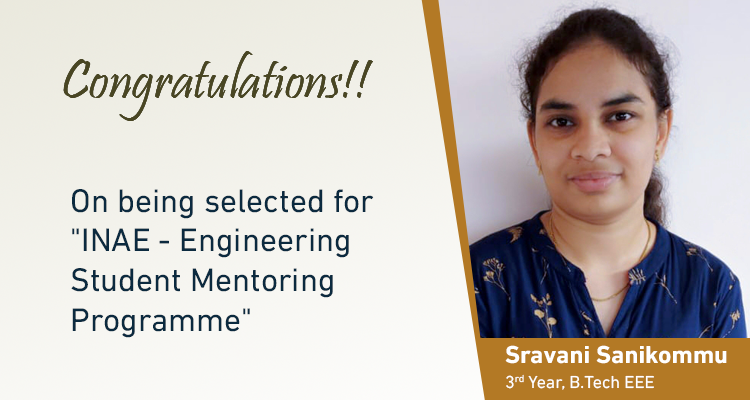 Ms Sravani Sanikommu, a vibrant and keen third-year Electrical and Electronics Engineering (EEE) student from SRM University-AP, has been selected for the prestigious Mentoring of Engineering Students by INAE Fellows Programme by the Governing Council of Indian National Academy of Engineering (INAE). She is one amongst 59 brilliant students who have been selected from across the country this year. The objective of this distinguished programme is to mentor outstanding B.E/BTech undergraduates by INAE fellows. Meritorious 3rd /4th year B.E./B. Tech students from recognised Engineering institutions are eligible under the scheme. Candidates must have a minimum of 75% or a CGPA of 7.5 to be considered for this programme. The mentorship program takes place through an online medium.
Ms Sravani Sanikommu, a vibrant and keen third-year Electrical and Electronics Engineering (EEE) student from SRM University-AP, has been selected for the prestigious Mentoring of Engineering Students by INAE Fellows Programme by the Governing Council of Indian National Academy of Engineering (INAE). She is one amongst 59 brilliant students who have been selected from across the country this year. The objective of this distinguished programme is to mentor outstanding B.E/BTech undergraduates by INAE fellows. Meritorious 3rd /4th year B.E./B. Tech students from recognised Engineering institutions are eligible under the scheme. Candidates must have a minimum of 75% or a CGPA of 7.5 to be considered for this programme. The mentorship program takes place through an online medium.
The Governing Council of the Indian National Academy of Engineers (INAE) designed the mentoring programme to encourage future engineers in the nation to make significant contributions to engineering and technology for holistic solutions. Due to COVID-19 pandemic, online internship is also available. Ms Sravani gets an opportunity to work online in the host institution in the field of power electronics under the able mentorship of INAE Fellow Prof B G Fernandes, Electrical Engineering, Indian Institute of Technology Bombay (https://www.ee.iitb.ac.in/wiki/faculty/bgf) for 2 Months. She extended her gratitude to Dr Tousif Khan N, the Head of the Department, and Prof Sastry V Vedula, a distinguished visiting professor in the Department of Electrical and Electronics Engineering, as well as an INAE fellow, for initiating her into the mentoring programme and providing constant guidance.
Sravani stated that she had complete supervision of faculty members of SRM-AP during the preparation for this two month Mentoring Programme. The extensive research expertise of faculty members aided significantly throughout the selection process among the finest applicants. “I thank everybody who has put efforts into making this happen. SRMAP can provide such amazing opportunities to research in the fields in which students are interested in working. This is made possible through the faculty members who are experienced in the specified fields which helps the students to learn more about the subject and form a substantial idea on how the concepts work. If somebody is keenly interested in research on something they love and are very passionate about it, SRMAP is the right place!!”, said Ms Sravani with overwhelming enthusiasm.
- Published in EEE NEWS, News, Students Achievements
Renowned physicists deliver talks at the “One-Day National Symposium on High Energy Physics.”
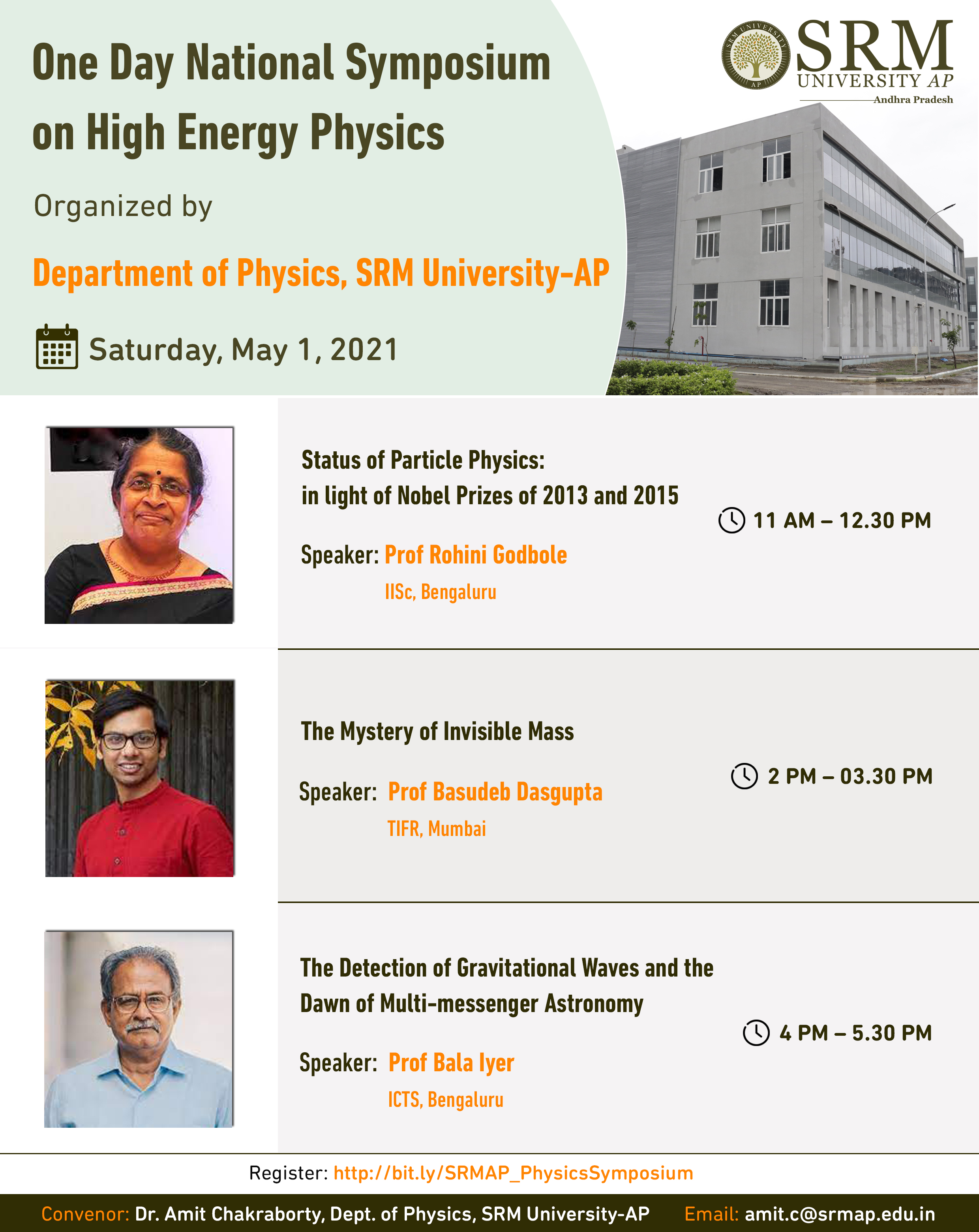 The Department of Physics, SRM University-AP organized a “One-day National Symposium on High Energy Physics” on Saturday, May 1, 2021. The session was held through online mode in the presence of honourable leaders of the university, faculty members, and attendees from various fields of interest. Prof V S Rao, the Vice-Chancellor, SRM University-AP, welcomed the gathering with a brief overview of the university’s inception and quick progress in the field of research.
The Department of Physics, SRM University-AP organized a “One-day National Symposium on High Energy Physics” on Saturday, May 1, 2021. The session was held through online mode in the presence of honourable leaders of the university, faculty members, and attendees from various fields of interest. Prof V S Rao, the Vice-Chancellor, SRM University-AP, welcomed the gathering with a brief overview of the university’s inception and quick progress in the field of research.
Three talks at the pedagogical level were organised for a wider audience, especially for the students of basic sciences and engineering streams. The first speaker, a Padma Shri awardee, Prof Rohini Godbole, who is a theoretical particle physicist at Indian Institute of Science (IISc), Bengaluru expounded on “Status of Particle Physics: in light of Nobel Prizes of 2013 and 2015”. She talked about the Higgs Boson’s theoretical postulate, for which the Nobel Prize in Physics was granted in 2013. According to studies, it was the final missing element in the Standard Model’s periodic table (SM). Her paper incorporated the experimental finding of the Neutrino Oscillation, as well as many compelling pieces of evidence that led to the 2015 Nobel Prize.
In the afternoon session, the talks were on the burgeoning field of Dark Matter physics and Gravitational-wave astronomy. Prof Basudeb Dasgupta from Tata Institute of Fundamental Research (TIFR), Mumbai apprised the participants on “The Mystery of Invisible Mass”. The deep understanding and expertise of Prof Dasgupta in the interfaces of particle physics, astrophysics, and cosmology with a particular emphasis on dark matter and neutrino physics as a theoretical physicist at the Tata Institue of Fundamental Research (TIFR) enlightened the audience. He stated that the human beings are able to see only 20% of the universe’s celestial objects; the remaining 80% are unseen and are referred to as “dark matter.” In his words, “Billions of years after the Big Bang, all we can see is the cloud’s surface, where the light is scattered.” Prof Basudeb, is a frequent speaker at prestigious international and national conferences and is a youth icon for aspiring physicists and scientists.
The final lecture of the day was delivered by Prof Bala Iyer from International Centre for Theoretical Sciences (ICTS), Bengaluru on “The Detection of Gravitational Waves and the Dawn of Multi-messenger Astronomy” at 4.00 pm. Prof Iyer is currently the Simons Visiting Professor at ICTS-TIFR Bangalore and co-PI of the LIGO-India Scientific Collaboration. He coaches and guides young minds interested in astrophysics, cosmology, and fundamental physics. Prof Iyer did a presentation on the discovery of gravitational waves from a binary black hole in 2015, which was a watershed moment and necessitated the launch of a new multi-messenger astronomy with the potential to have a significant impact on astrophysics. “Any relativistic theory of gravity must be consistent with the special relativity principle. Gravity’s effect cannot travel faster than the speed of light. If an item’s gravitational field changes, the changes propagate over space and take a certain amount of time to reach the object “, he added.
The symposium that aimed to discuss the current status of exciting research topics of High Energy Physics concluded with a Q&A session. This has proved that the faculty members and participants were highly inspired and motivated after attending the symposium and listening to the scholars.
Pre-Event Release: https://srmap.edu.in/events/national-symposium-on-high-energy-physics-2021/
- Published in News, Physics News
Let Passion Drive our Profession
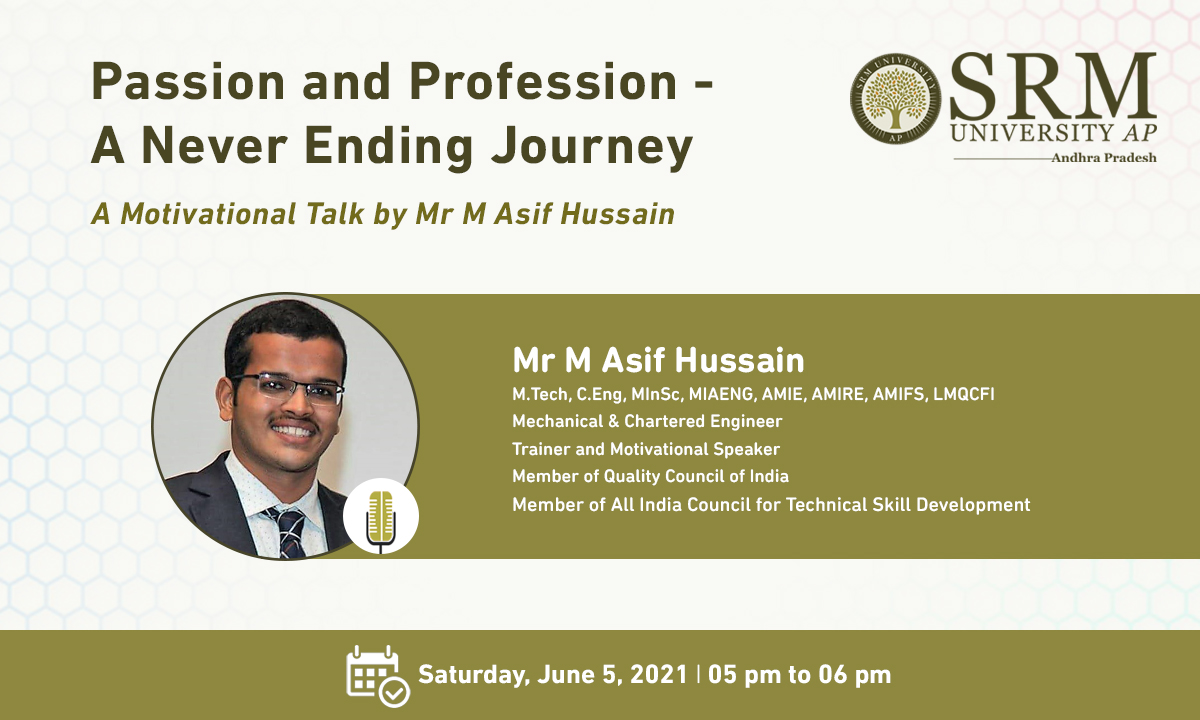 “All our dreams can come true if we have the courage to pursue them”, said Walt Disney, a pioneer of the American animation industry. Oftentimes we need a push forward to achieve our dreams and aspirations. A smart person is willing to listen, learn and respond efficiently to succeed in all aspects of their life. Mr Muddubhai Asif Hussain is such a young and vibrant personality who set foot in diverse professional arenas and achieved enviable success. Department of Student Affairs has scheduled an interactive motivational session with Mr Hussain on the topic “Passion and Profession-A Never Ending Journey” on June 5, 2021, at 5.00 pm for the students of our university. All students are invited to benefit from this worthwhile session. Let us Dream High, Stay Humble and Achieve Success.
“All our dreams can come true if we have the courage to pursue them”, said Walt Disney, a pioneer of the American animation industry. Oftentimes we need a push forward to achieve our dreams and aspirations. A smart person is willing to listen, learn and respond efficiently to succeed in all aspects of their life. Mr Muddubhai Asif Hussain is such a young and vibrant personality who set foot in diverse professional arenas and achieved enviable success. Department of Student Affairs has scheduled an interactive motivational session with Mr Hussain on the topic “Passion and Profession-A Never Ending Journey” on June 5, 2021, at 5.00 pm for the students of our university. All students are invited to benefit from this worthwhile session. Let us Dream High, Stay Humble and Achieve Success.
About the Speaker: Mr Muddubhai Asif Hussain has been the District President of National Youth Council of India, District Advisor for World Human Rights Council, and a recipient of ‘InSc Young Achiever Award 2020’ from Institute of Scholars, Bangalore. A mechanical engineer by profession, Mr Hussain is building his prowess and passion as a Chartered Engineer, Social Activist, Philanthropist, Political Consultant, Strategic Planner, expert in Campaign Management, an Orator and a Motivational Speaker.
- Published in Events, Students Affairs Events
“Films as History; Exploring Historiophoty”, the First of Illuminating Webinar Series
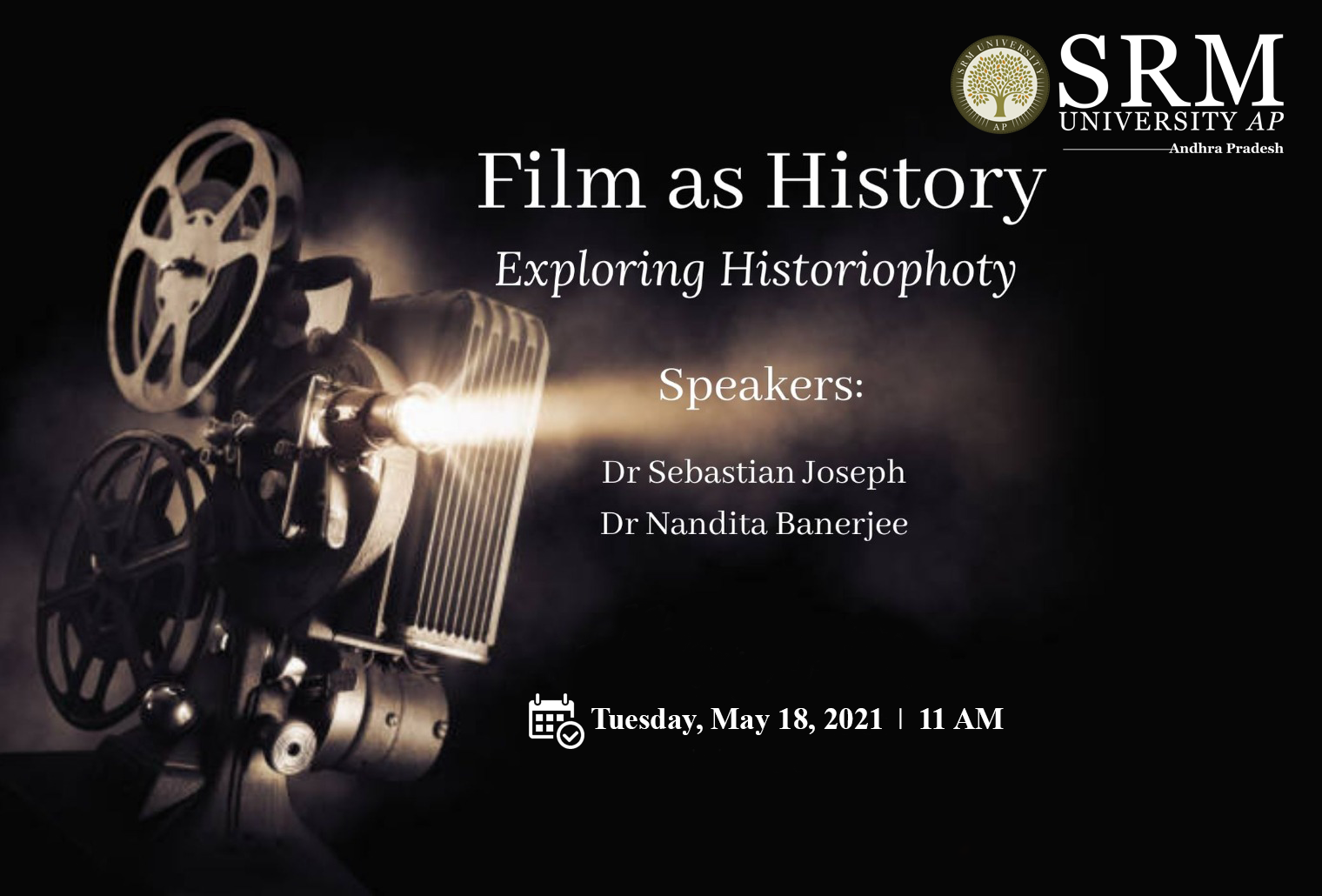 A webinar aimed to discuss the use of films in particular and visual images in general as sources for the reconstruction of History was organized by the Department of History on May 18, 2021. Films as History; Exploring Historiophoty, the first of the monthly Webinar series on new and exploratory themes in History, dealt with the promises and challenges of Historiophoty as a sub-stream of history. Following Hayden White’s pathbreaking analysis of visual imagery and its location in historiography, historiophoty has emerged as a most promising pathway for historians particularly as we move towards a rapidly digitizing world.
A webinar aimed to discuss the use of films in particular and visual images in general as sources for the reconstruction of History was organized by the Department of History on May 18, 2021. Films as History; Exploring Historiophoty, the first of the monthly Webinar series on new and exploratory themes in History, dealt with the promises and challenges of Historiophoty as a sub-stream of history. Following Hayden White’s pathbreaking analysis of visual imagery and its location in historiography, historiophoty has emerged as a most promising pathway for historians particularly as we move towards a rapidly digitizing world.
Dr Sebastian Joseph, a Historian and Film Critic and recipient of the State Award for Best work on Film History 2020, and the author of Cochin Forests and British Techno-ecological Imperialism in India addressed the first part of the webinar. He compared the textual and cinematic representations of history through the lens of the Historian Robert Rosenstone, who divided the plot of a film into three parts: beginning, middle, and end. Dr Joseph conveyed his knowledge of history and cinema through six distinct characteristics put forth by Rosenstone.
(i) A distinction was made between textual and cinematic representations of history, with the latter presenting problematic and conceptual history in a narrative format for better comprehension. (ii) Cinematic representations of history resemble personal narratives more than historical narratives. The straightforward narrative representation aims to communicate and establish an immediate connection with the audiences behind the cinema screens. (iii) The storyline narrated in historical cinematic representations must have a satisfactory conclusion. Historical representations of films dramatize, personalize, and emotionalize, whereas textual history critiques the emotional aspects, as they can invalidate the credibility of the sources. (iv) Film adds to the overall emotional experience of viewers by using music, sound effects, dialogue, and so on. Dr Joseph deduced from Rosenstone’s fifth and sixth characteristics that the historical depictions in cinema are fictional and reflect the socioeconomic and political conditions of society. At the end of the session, he postulated that “there is a tale behind every story, and there is no way that we can look at films as secondary sources of history, but as the primary source for history and historical explanations.”
Dr Nandita Banerjee, Associate Professor at Sidho-Kanho-Birsha University, West Bengal delivered the keynote address during the second half of the webinar. Dr Banerjee provided a critical analysis of the evolution of traditional art and visual images into digitised form. Historians observed the live depiction of civil wars, conflicts, and protests through the documentation captured on camera footage. Visual evidence such as photographs and records are authentic sources and history would be incomplete without them. She further added that “Learning from history is never a one-way street, and learning about the present in light of the past entails learning about the past in light of the present. History is the in-depth study of the past and present. Images, according to some world historians, are the established method of remembering the past. Since the dawn of human evolution, the visual image has served as a representation of social memories in art. ” She validated her perspective by citing the German war and the Vietnamese conflict, both of which are visible in world history because of visual and oral footage. Dr Banerjee also discussed the enormous influence visual images on audiences and the place it marks in the worlds of film and history.
The webinar came to an apprising close with a panel discussion followed by a Q&A session.
Pre-Event Release: https://srmap.edu.in/events/films-as-history-exploring-historiophoty/
- Published in Departmental News, History Current Happenings, History News, News
ICMR-NIN Scientist on the Dietary Risk Factors for NCDs
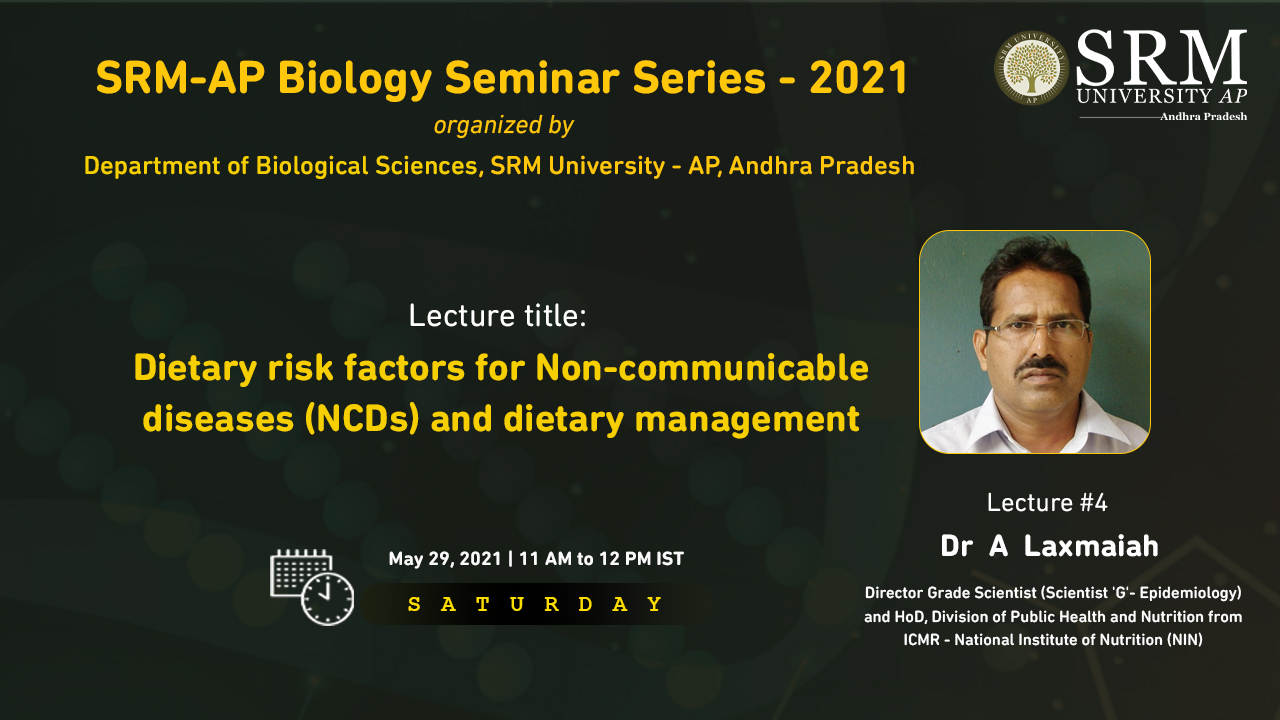 A profound and astute fourth edition of the Biology Seminar Series on the theme “Dietary Risk Factors for Non-communicable Diseases (NCDs) and Dietary Management”, which was held on May 29, 2021, addressed the vital questions on factors contributing to the rise in non-communicable diseases. Dr A Laxmaiah, Director Grade Scientist (Scientist ‘G’- Epidemiology) and HoD, Division of Public Health and Nutrition from ICMR – National Institute of Nutrition (NIN), elucidated on the topic and discussed the role of nutrition in alleviating such risks.
A profound and astute fourth edition of the Biology Seminar Series on the theme “Dietary Risk Factors for Non-communicable Diseases (NCDs) and Dietary Management”, which was held on May 29, 2021, addressed the vital questions on factors contributing to the rise in non-communicable diseases. Dr A Laxmaiah, Director Grade Scientist (Scientist ‘G’- Epidemiology) and HoD, Division of Public Health and Nutrition from ICMR – National Institute of Nutrition (NIN), elucidated on the topic and discussed the role of nutrition in alleviating such risks.
Dr Laxmaiah stated that almost 38% of children in India are stunted and over 21% are wasted, which is a very alarming statistic. He also noted that, according to reports, more than 60% of the country’s population suffers from iron deficiency, as well as other serious vitamin deficiencies. According to him, a 2016 study discovered that almost 5.8 million people die in India each year because of non-communicable ailments. Dr Laxmaiah stated that the rise in NCDs is primarily due to smoking, physical inactivity, harmful alcohol consumption, and unhealthy diet. The poor dietary intake among Indians was identified as an alarming issue and he further highlighted the need for individuals to adhere to a traditional diet rich in vitamins and minerals. The session was aimed to raise community awareness on the risk factors for non-communicable disease and the urgency of taking action to address the growing concern of NCDs.
Upon the completion of the lecture, an interactive discussion session followed with the topic overview, providing participants with an opportunity to ask in-depth questions.
Pre-Event Release: https://srmap.edu.in/events/biology-seminar-series-04/
- Published in Biology News, News
Department of Economics organised an International conclave of Agricultural Sustainability
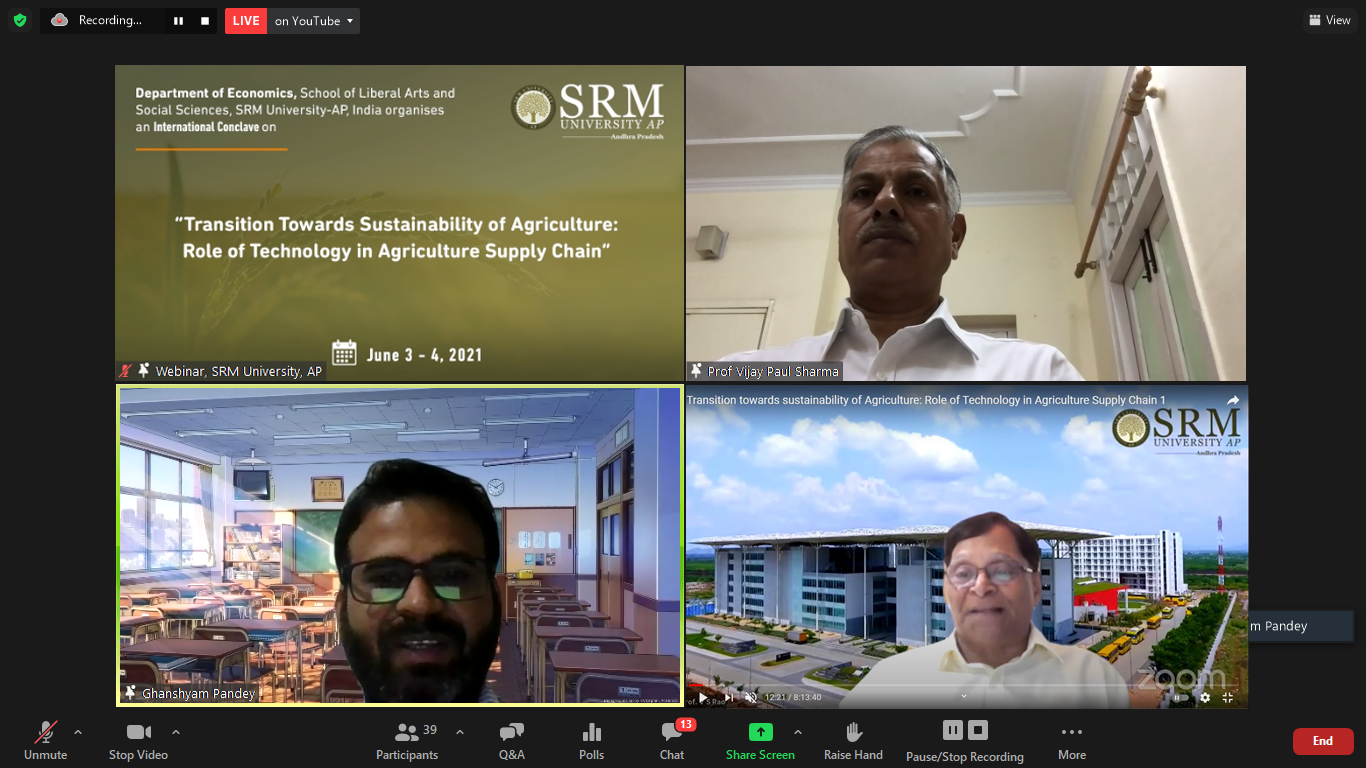 Department of Economics, SRM University-AP organised the International Conclave on “Transition towards sustainability of Agriculture: Role of Technology in Agriculture Supply Chain” on June 3-4th, 2021. Prof Vijay Paul Sharma, Chairman, Commission for Agriculture Costs and Price (CACP), Ministry of Agriculture & Farmer Welfare, GoI, India, was the chief guest of the event. The tope agricultural economist from India and abroad from the reputed institutions, i.e., Arizona State University, USA; Bangabandhu Sheikh Mujibur Rahman Agricultural University, Bangladesh; ICAR-NIAP; IFPRI South Asia Office Delhi; JNU, IIMA, IIMB, IGIDR Mumbai, Delhi School of Economics; Institute of Economic Growth; Symbiosis School of Economics, Pune; Central University of Punjab; Central University of Jammu; Sharda University, Noida; Amity University, Noida; PAU, Ludhiana; AN Sinha Institute of Social Sciences, Patna; Centre for Development Studies; Thrivanthapuram delivered lectures and participated in Panel Discussions in the two-day event.
Department of Economics, SRM University-AP organised the International Conclave on “Transition towards sustainability of Agriculture: Role of Technology in Agriculture Supply Chain” on June 3-4th, 2021. Prof Vijay Paul Sharma, Chairman, Commission for Agriculture Costs and Price (CACP), Ministry of Agriculture & Farmer Welfare, GoI, India, was the chief guest of the event. The tope agricultural economist from India and abroad from the reputed institutions, i.e., Arizona State University, USA; Bangabandhu Sheikh Mujibur Rahman Agricultural University, Bangladesh; ICAR-NIAP; IFPRI South Asia Office Delhi; JNU, IIMA, IIMB, IGIDR Mumbai, Delhi School of Economics; Institute of Economic Growth; Symbiosis School of Economics, Pune; Central University of Punjab; Central University of Jammu; Sharda University, Noida; Amity University, Noida; PAU, Ludhiana; AN Sinha Institute of Social Sciences, Patna; Centre for Development Studies; Thrivanthapuram delivered lectures and participated in Panel Discussions in the two-day event.
The event started with the welcome address of Dr Ghanshyam Pandey, Assistant Professor and Head of the Department of Economics and the opening remarks were delivered by Prof V S Rao, Vice-Chancellor, SRM University-AP.
“The agriculture and food sector are facing multiple challenges. With the global population projected to grow from 7.6 billion in 2018 to over 9.6 billion in 2050, there will be a significant increase in the demand for food. At the same time, the availability of natural resources such as fresh water and productive arable land is becoming increasingly constrained. Production is not the only concern; although agricultural output is currently enough to feed the world, 821 million people still suffer from hunger. Processes such as the rapid rate of urbanisation also have important implications for food production patterns and consumption patterns. This will require an urgent transformation of the current agri-food system. Digital innovations and technologies may be part of the solution. In the agriculture and food sector, the spread of mobile technologies, remote-sensing services, and distributed computing are already improving smallholders’ access to information, inputs, market, finance, and training. Digital technologies are creating new opportunities to integrate smallholders into a digitally-driven agri-food system,” said Prof Rao.
In the first Keynote speech of the conclave Prof Vijay Paul Sharma, Chairman, Commission for Agriculture Costs and Price (CACP), Ministry of Agriculture & Farmer Welfare, GoI, India, explained all the aspects of the agriculture sector to achieve sustainable growth. He started with agriculture production shifted from supply-driven to demand-driven, filling the yield gap between the states and moved on to the right kind of government intervention to improve the farmers’ welfare, shortage of labourer and mechanisation, technology, credit infrastructure, public investment, and climate change and variability.
Prof R S Desh Pande, a renowned economist, pointed out that we are at a stagnant point in agriculture, and the sustainability of agriculture would be very challenging. He mentioned that commercialisation (cropping method) and greed are the two major enemies of sustainability. He mentioned that largely we are getting the technology which is cost increasing techniques rather than cost-saving which ultimately leads to the decline of the net income of the farmers from the last two decades.
Advancing into the event, Prof P S Birthal, National Professor, ICAR-NIAP, PUSA Delhi, India, illuminated the audience with his strategic discussion on Agricultural Technologies and Supply Chains for Sustainable Agricultural Development. He discussed that in all revolutions in agriculture and allied activities in India, a common element had been the technology, although it was driven by different agents. He mentioned that technology is a key source for agricultural growth. Investment in research and development has increased but much less than the several developing and developed countries globally. He also mentioned that growth in agricultural markets had not kept pace with growth in agricultural production. Markets are inefficient because of poor infrastructure and communication networks that result in the higher cost of trade to sellers and buyers, along with asymmetric information between them. He has given some suggestions for farmers to benefit from, i.e., doorstep offtake of the produce, access to improve technology, quality inputs, access to credit insurance against market price, and diversification from water-guzzling crops like rice.
Prof Prem Vashistha from Sharda University highlighted the research innovation done by IFCO for liquid urea. A bottle of 5 ml urea is equally effective to one bag of urea, which is economical and reduces the burden of subsidy from the government. He mentioned this kind of revolution we required in all the areas for sustainable agriculture reducing subsidies. He also gave stress on linkages between institutions with the market are very important.
While talking on the role of technologies for sustainable agriculture, Dr Anjani Kumar, a senior fellow from International Food Policy Research Institute, South Asian Office, Delhi, mentioned how research is essential. Dr Kumar indicated that marginal returns to agricultural R&D expenditure are low for high-income states while more for low-income states. His research shows that R&D significantly impacts reducing poverty and inequality. He also mentioned that the seed replacement rate is frequently high in developed states while very low in underdeveloped states.
Almost 20 distinguished panellists and 20 presenters, along with more than 100 participants, attended the event. Dr Ananda Rao Suvvari, Assistant Professor, Department of Economics, SRM University-AP, cordially thanked all the speakers and panellists for their efforts to make the conclave a grand success.
Pre-Event Release: https://srmap.edu.in/events/economics-international-conclave-role-technology-sustainable-agricultural-growth/
- Published in Economics Current Happenings, Economics News, News
Reimagine, Recreate, Restore: World Environment Day Quiz
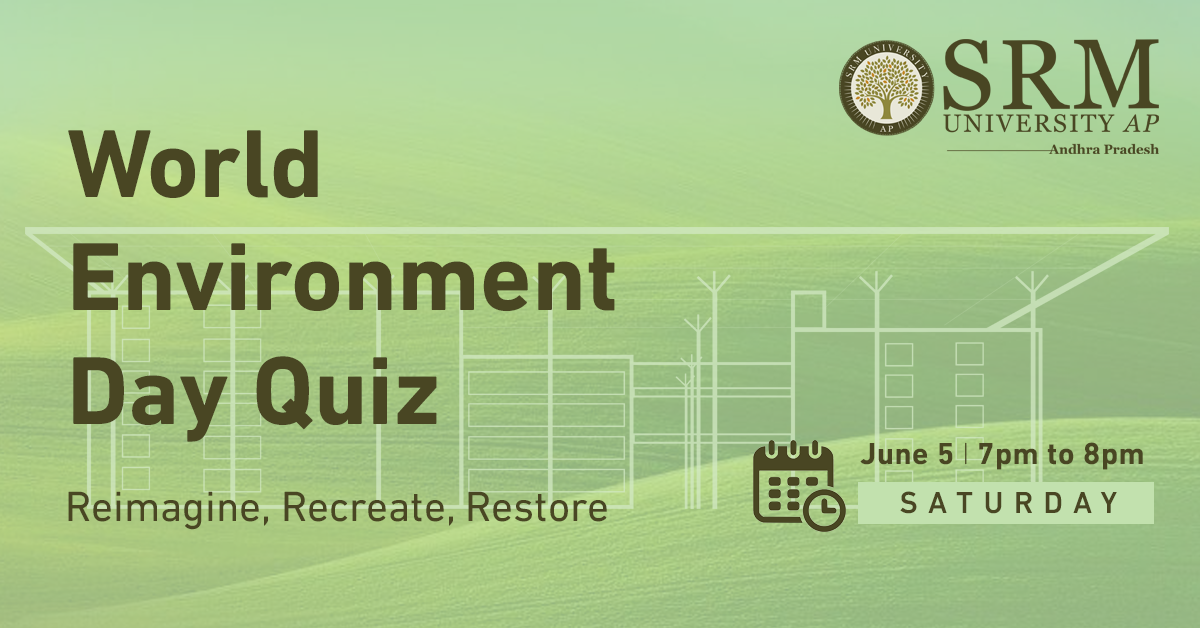 Sustainable development that curbs pollution and thus prevents the extinction of species from the surface of the earth is the urgent need of the hour. The United Nations Assembly established World Environment Day in 1972 to fundamentally raise awareness among people about the importance of ecosystem preservation. Since then, World Environment Day is observed on June 5 annually with eco-sensitive themes to remind individuals and organisations about their duties and responsibilities towards the gift of nature.
Sustainable development that curbs pollution and thus prevents the extinction of species from the surface of the earth is the urgent need of the hour. The United Nations Assembly established World Environment Day in 1972 to fundamentally raise awareness among people about the importance of ecosystem preservation. Since then, World Environment Day is observed on June 5 annually with eco-sensitive themes to remind individuals and organisations about their duties and responsibilities towards the gift of nature.
This year’s theme: ‘Reimagine.Recreate.Restore.’ marks the beginning of the United Nations Decade on Ecosystem Restoration. The Department of Student Affairs, SRM University-AP is organizing a Quiz Programme for the students on June 5, 2021, at 7:00 pm to ensure commitment to the earth’s reviving mission, as a green and sustainable university.
“Nature is healing” is a misleading message that has been circulated in the digital world during these Covid-19 pandemic days when human activities are shut down around the world. It is not just a year or a decade since humans have started exploiting, looting, and destroying the wildlife, coral reefs, deserts, mountains and more. Let us be a generation that reimagines creative ways to restore our natural resources.
All are welcome!
- Published in Events, Students Affairs Events

